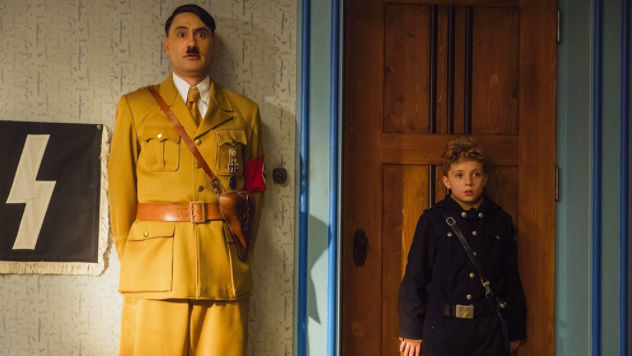When thinking of Nazis, let alone the Third Reich, humor isn’t usually the emotion that is aroused. Yet somehow, Taika Watiti — previously the director of “Thor: Ragnarok” and “Hunt for the Wilderpeople” — manages to serve the audience a tricky blend of sweet and charming farce against the backdrop of a time in history that is very far from it.
The film, in essence, is a coming-of-age tale that crosses over with a satirical black comedy of the Nazi mindset. The story centres around ten year old Johannes “Jojo” Beltzer — played by Roman Davis — who lives in a small German town, imbibing the propaganda and Nazi youth culture that surrounds him. In the film, Jojo confides in his imaginary friend who just happens to be Adolf Hitler — played by Watiti. The Fuhrer serves as Jojo’s emotional support and confidant, whose silly demeanour is part a reflection of the child’s insecurities about being unable to be a ruthless Nazi youth soldier, part tool through which the ridiculousness of the Nazi lifestyle and mindset are put forth.
Hitler, in this film, is immature and comedic, fist bumping Jojo and shouting “You’ve got this!” during his anxious moments. The phrase “Heil Hitler” in the real world is an emblem of allegiance to their leader for the Nazis, and in current day not something loosely thrown around. In fact, in present day Germany, this salute is deemed illegal and is an offence punishable by up to three years in prison. In “Jojo Rabbit,” however, “Heil Hitler” becomes a point of ridicule, distracting the Gestapo, let alone all nazis from engaging in their actual tasks. The constant repetition of the phrase truly sucks out the life and blood from its true meaning, making it seem somewhat like the modern day slang of “Sup.”
Despite the eccentrically-humorous scenes punctuated throughout, the film does not lose sight of Jojo’s growth in order to confront his blind nationalism as the war rages on. In the movie, the banality and evil of the Third Reich are quite evidently filtered. This simply is possible because we see the world through the eyes of a sensitive and smart German child, who discovers a Jewish girl, Elsa, whom his single mother — played by Scarlett Johannson — has been hiding in their attic. Jojo, expectedly, is resentful of the girl because she is Jewish, but overtime starts to become infatuated by her.
Through this relationship, the film brings to light the absurdity of anti-Semitism — with stereotypes about Jews having horns and being born in caves, being a few examples. Elsa and Jojo’s bond also acts as the means through which Jojo realises he cannot be the ruthless Nazi that hates Jews as spitefully as many elders in the film, with the exception of his mother, want him to. The fact remains, however, we as viewers are more informed than Jojo, not only due to the fact that we are aware of the history he is living in, but also because we are familiar with the trajectory of his type of coming-of-age story. It is only in time when he finds his mother, Rosie, hung to death in the centre of town that the harsh realities of the evil system that is painted as so cartoonishly throughout the movie, become apparent to Jojo.
After being transported to a time and place where nazism was the norm, with the intent of being funny, even daringly so, the hard truth of a child having his only loved one abruptly snatched away from him creates a sense of ethical urgency. Between all the jokes and slapstick, chills go up the spine during this scene. This is when the movie illustrates why humorous depictions and seemingly light takes on menacing dictators in general, can be so valuable.
“Jojo Rabbit” may be criticised for being too whimsical and cute for a story about ruthless Nazis and persecuted Jews. However, the film is also about how good, ordinary people keep loving and helping each other, even while being governed by a madman. The film in making humour its driving force makes us understand that the ones abusing power, although dangerous in reality, are neither omnipotent nor invincible. It is ok to laugh at them.
When the movie comes to its final scene, the war is over. The Nazis no longer have the upper hand, and we see Jojo and Elsa staring out the window into the night sky lit up by celebratory fireworks. There is an endearing and almost magically powerful visual testament that is made on screen as Jojo leans his head on Elsa’s shoulder in the very last moments of the film. It is a reminder of an indispensable fact: turbulent times come and go, but human compassion persists, no matter what. This goes to say that, as a result, there is always something to laugh at/about or ridicule, even in a ruthless place like Nazi Germany.





